The Michael G. DeGroote Institute for Pain Research & Care
Toward the conquest of pain



Using the conceptual model of chronic post-surgical pain, bring together behavioural, clinical and basic scientists to develop a new understanding of the origin, mechanisms and treatment of chronic pain.
In 2003, businessman Michael G. DeGroote made history when he made the largest single donation ever to a Canadian university or institution. His donation of $105 million has had a wide impact on health sciences research, education and care, and accelerated the pace of discovery at McMaster.
 - Dr. Jason Busse, Director
- Dr. Jason Busse, Director
of the
Michael G. DeGroote National Pain CentreMcMaster’s Faculty of Health Sciences followed a “people first” strategy in allocating the $105 million gift from Mr. DeGroote. Emphasis was placed on hiring international caliber experts in health education, research and care, particularly in the areas of pain, infectious diseases, stroke prevention and cancer. One of the key initiatives was the Michael G. DeGroote Institute for Pain Research & Care, which received a $15 million endowment. “With this gift,” Mr. DeGroote said, “I know McMaster will be able to make new breakthroughs and make a real difference in more people’s lives.”
Michael G. DeGroote died in September 2022, at the age of 89. Though he is no longer with us, his generosity and philanthropic efforts ensure his legacy will live on and enable innovation in research for years to come.
“Mr. DeGroote was a tireless advocate for advancing the management of pain and promoting research of novel therapeutics, including medical cannabis.”
“Mr. DeGroote’s gift literally changed the face of pain research in Canada. I have known Mr. DeGroote for two decades, and he presented us with challenges as well as tremendous support and motivation. His gifts to create the Michael G. DeGroote Institute for Pain Research and Care, and the National Pain Centre, have had an immeasurable impact upon pain care and research in Canada.”
- Dr. Norm Buckley

Once again, Dr. Panju and I are excited to welcome you to the Scientific Advisory Board meeting for the Michael G DeGroote Institute for Pain Research & Care. This has been a productive year, and this report includes updates on our supported students and investigators, as well an overview of our work to engage the research community on the topic of chronic pain. We are pleased to welcome our Scientific Advisory Board members who represent a Who’s Who of the National and International world of Pain Research and Care.
Our vision is to use the clinical problem of chronic post-surgical pain as an experimental model in which chronic pain, its causes, predisposing factors and treatments can be studied. We have now seen knowledge synthesis projects funded in the early stages of the IPRC turn into clinical trial protocols and have supported basic science projects which have fascinating sex difference clinical implications leading to reanalysis of previous trials from McMaster University.
The Chronic Pain Network, one of five networks addressing chronic disease funded through the Canadian Institutes of Health Research Strategy for Patient Oriented Research, was successful in its application for renewed funding through a competition for the SPOR chronic disease

networks to re-focus on Knowledge MobilizationImplementation Science. This extension of the Network will allow us to apply the knowledge generated during the inaugural Network activity.
This year also saw the launch of Pain Canada. Supported by Health Canada and led by PainBC, Pain Canada is a partnership of advocates, researchers, clinical experts and pain organizations from across the country, seeking to improve systems of care and support for people living with pain.
The Institute is linked through common membership with the clinical practice of pain care in Hamilton, both acute post-operative pain and chronic pain including interventional, pharmacologic and behavioural care, and is working to broaden its relationships across the country. The Chronic Pain Centre of Excellence for Canadian Veterans, announced July 2019 and launched on April 1, 2020 as an independent ‘not for profit entity,’ has McMaster and Hamilton Health Sciences as key partners. It is rapidly establishing a national and international presence.
Our aim is to direct the Institute’s resources towards infrastructure and training. Two-thirds of our research budget is already allocated to fellowships, seed grants and graduate awards. In this way we hope to support the future of pain research in Canada.
Thank you for your interest and support. We look forward to the future.
Norm Buckley, BA (Psych), MD, FRCPC Scientific Director Michael G. DeGroote Institute for Pain Research and Care McMaster UniversitySixty-eight percent of our annual budget is spent directly on research awards (grad studentships and postdoctoral fellowships) and research projects (seed grants, IPRC/MIRA catalyst grant, and other funded research projects).
Annual administrative costs are 29% of the total budget, while operating costs (including community engagement through the IPRC Symposium, Canadian Pain Care Forum meetings, National Faculty meetings) make up 3% of annual expenses.
In addition to the research and operational activities within the Institute, our IPRC research and operational team administers 18 projects funded by various sponsors:
7 full-time and part-time Institute staff members, overseeing all operations and activities

19 multidisciplinary research team members from nine health disciplines
$750,364 spent this year on research awards and projects
10 research awards and projects funded every year
88 publications on the topic of pain by our members last year
Each year, the Institute for Pain Research & Care and National Pain Centre each see nearly 30,000 hits, respectively, and nearly 80,000 page views on their websites. One of the Institute’s goals for 2022/2023 is to build our digital presence by increasing our digital marketing efforts. It is our objective to see these numbers rise by at least 25%, as well as to improve our organic search ranking
In 2021, the Institute was one of 1,399 organizations and
individuals to take part in the National Pain Awareness Week #PrioritizePain social media campaign. One of the aims of the campaign was to promote the hashtag #PrioritizePain to increase awareness around the gaps in the diagnoses, treatments and addressing the unmet needs of those living with pain. The campaign saw 8.9 million impressions and had a reach of 2.7 million.
29,500+ visitors
websites
77,206 page views
10,000+ impressions on Twitter.
835 followers on Social Media channels

Project Titles: Feasibility of a Presurgical Rehabilitation Program for Lumbar Spinal Stenosis
Supervisor: Dr. Luciana
MacedoLumbar Spinal Stenosis (LSS) is associated with significant functional decline and is the most common reason for lumbar spine surgery among older adults. However, as many as onethird of individuals undergoing lumbar spine surgery continue to have long-term pain and disability post-operatively. Identifying and implementing strategies to address modifiable risk factors prior to surgery may improve success with postoperative outcomes. Therefore, the proposed study will aim to evaluate the feasibility of an e-health presurgical rehabilitation (prehab) for individuals scheduled for LSS surgery. This study will include a pilot randomized controlled trial (RCT), with 60 patients randomized 1:1 to prehab or minimal intervention, that will be assessed at baseline, after the intervention, and six and 12 months post-operatively; and qualitative interviews (12-15 individuals from the prehab program) conducted at the same time points. Prehab will include an eight-week exercise and educational program that will be delivered virtually by an experienced clinician, with a booster session at six weeks post-op. The minimal intervention group will receive the educational content and undergo usual care as per standard practice. We will include feasibility outcomes (e.g., recruitment/follow-up rates, adherence, acceptability of the program/questionnaires) with pre-identified thresholds. The qualitative interviews will explore changes in outcomes over time and experiences with the program. The outcomes of this study will provide insight into the post-surgical recovery and will inform the development of a user-centered prehab program.
“With the support of the IPRC, I have been able to present my work at international conferences for back pain research. Additionally, I have been able to expand my network and work with researchers from the Universities of Alberta, Calgary and Toronto.”
- Nora Bakaa
Project Title: Postsurgical Pain and Neurocognitive Outcomes After Non-Cardiac Surgery in Older Adults
Supervisor: Dr. Maura Marcucci
Brief Overview and Progress to Date
Surgery is associated with postoperative cognitive dysfunction (POCD). Chronic postsurgical pain (CPSP) can interfere with mobility, which can affect cognition. Hence, CPSP might be associated with POCD. A suggested mechanism of interaction between postoperative pain, satisfaction and cognition is neurogenesis interference, which can be assessed using highinterference memory tests. Certain neurotrophic factors might mediate the interaction of pain, mobility and satisfaction with cognition. Postoperative patients’ coping abilities predict oneyear pain persistence and functional recovery and might be affected by cognition.
Aims of the study are to explore: (1) associations of CPSP and patient satisfaction with POCD, (2) whether postoperative cognitive changes are associated with changes in neurogenesissensitive memory tests and neurotrophic factor levels, and (3) association between coping strategies and cognitive function. We aim to recruit 100 patients ≥50 years old undergoing elective total knee or hip arthroplasty. Socio-demographics, pain and pain medications are assessed preoperatively. Coping abilities are assessed at baseline and four to six weeks postoperative. CPSP (presence and severity) and satisfaction are measured at three and six months. Cognitive/ neuropsychological assessments are administered at baseline, four to six weeks, three, six and 12 months postoperatively. Blood samples are collected for plasma biomarker analysis.
We have enrolled 40 participants in the study so far, with 15 providing consent for blood collection. We extended the scope of the study to include hip arthroplasty patients.
“As a student, pain clinician and researcher, the IPRC Studentship helped me focus on my work and maintain my standards.
It has provided me the opportunity to interact and collaborate with prominent pain researchers. It is a strong motivation for me in the research field, and will help me become a ClinicianScientist dedicated to pursuing my career in pain medicine.”
- Maram Khaled
Maram Khaled, BSc, DC, MSc PhD Candidate

Project Title: Predictors and Trajectories of Pediatric Postsurgical Pain
Supervisor: Dr. Norm Buckley & Dr. Louis Schmidt
Brief Overview and Progress to Date
Postsurgical pain affects up to one in five children undergoing surgery in Canada each year. It is associated with a myriad of adverse clinical, psychological and developmental sequelae including increased analgesic use, delirium, delayed recovery, and fear of future medical care. Although the impact of CPSP in adults is well-established, the literature on CPSP in children remains largely unclear and incomplete. The extrapolation from adult data is limiting because children experience, express and perceive pain differently than adults. To date, only a handful of studies have described the course of pediatric CPSP and no studies have examined the predictors and trajectories of pediatric postsurgical pain using objective and valid neurophysiological measures. Given these shortcomings and needs, the proposed project will aim to establish biological, psychological, and social predictors of the development on pediatric CPSP and its trajectory. Moreover, this will be the first study to examine the associations between biomarkers (i.e., EEG, cortisol and heart rate) and pain in pediatric surgery. The findings of this project may help to clarify the roles of anxiety, stress and parental factors on acute and persistent postsurgical pain. This study has the potential to guide future research on the development of preventive interventions in managing pediatric postsurgical pain.
“The IPRC fellowship provides me with great opportunities to work with and learn from experts across a wide range of clinical and research skills. I have been able to establish multi-national collaborations and to gain more in-depth knowledge about pediatric pain.”
- Cheryl Chow

Project Title: Pain Care Yoga for People with Knee Osteoarthritis: A Feasibility and Pilot Randomized Controlled Trial
Supervisor: Dr. Lisa CarlessoBrief Overview and Progress to Date
Osteoarthritis (OA), of which the knee is the most affected joint, is the leading cause of pain and disability in older adults, affecting more than 500 million people worldwide and significantly contributing to healthcare costs. Given that there are currently no disease modifying drugs and that exercise provides small to moderate effects on pain, the purpose of this project is to investigate the effects of a novel Pain Care Yoga program on intrinsic pain modulation for people with knee OA. The Pain Care Yoga program consists of the combination of yoga techniques and strengthening exercises with pain neuroscience education. We will assess changes in pain intensity and pain modulation through physical testing, including levels of Brain Derived Neurotrophic Factors and Nerve Growth Factors. Currently, we have obtained ethics approval for the feasibility phase of the study and have recruited half of the participants. We anticipate completing this phase by November 2022, after which the results will be ready for publication. The feasibility outcomes (follow-ups, acceptability, burden, recruitment, adherence and adverse events) will be used to identify suggestions for program modification for the pilot randomized controlled trial, which will begin by early 2023. We will compare the Pain Care Yoga program to standard strengthening exercises and OA education.
“The IPRC fellowship has enabled me to conduct research that has the potential to positively impact the lives of millions of people. This has provided me with a lifelong personal satisfaction; to improve the quality-of-life of people.
In addition, it has been a tremendous step towards achieving career goals of becoming an experienced and informed researcher in health studies.”
- Dr. Shirin Modarresi

Project Title: Interventional Treatments for Chronic, Local or Radicular, Non-Cancer, Spinal Pain: A Systematic Review and Network Meta-Analysis of Randomised Trials
Supervisor: Dr. Jason Busse
Brief Overview and Progress to Date
Chronic spine pain is prevalent in Canada, and interventional pain medicine (IPM) procedures (e.g. trigger point injections) are commonly used. Given escalating use, and the associated costs, government payers are becoming increasingly concerned about the value of these services. Specifically, despite limited evidence of effectiveness, unpublished data from Health Quality Ontario (HQO) using Ontario Health Insurance Plan (OHIP) billing data indicates that the use of some IPM procedures has more than doubled from 2011 to 2015, primarily by an increase in the number of procedures without much increase in the number of patients. Moreover, a 2017 survey of interventional pain physicians in Canada found high variability in practices and that only 37% (69 of 186) believed that their colleagues practiced in accordance with current best evidence.
We are working with a group of methodologists, content experts and patient partners from eight countries to conduct a comprehensive systematic review and network metaanalysis (NMA) of interventional procedures for local and referred chronic spine pain. We expect to address the limitations of previous reviews and support the development of BMJ Rapid Recommendations for practice.
“The IPRC Fellowship has given me great support to do my research. This Fellowship has meant I can always focus on work without worrying about other issues, such as finding team members. Working with the Institute also allows me to work flexible hours, helping me to balance my work and home life, which is especially beneficial as a new mother.”
- Dr. Xiaoqin Wang
Who is Susceptible to Developing CPSP? A HighThroughput Clinical Proteomics-Based Approach for the Prediction of Susceptibility
Primary Investigator: Fei
Start Date: 2021
Geng, PhD
Brief Overview and Progress to Date
During this project, we proposed a Machine Learning workflow for patient diagnosis, which can be generally applied to the discovery of pain signatures. The workflow was applied to a four-category, patient dataset; the results demonstrate its ability to improve diagnosis accuracy, as well as identify protein biomarkers associated with the most important disease pathways. We believe this workflow shows great potential in the discovery of novel pain signatures by improving the distinction between acute and chronic pain types, hence reducing false-discovery rates. Moreover, the identification of biomarker sets can further enhance the definition of pain signatures associated with each class. This allows clinical experts to develop and prescribe precision medicine, reducing the reliance on generally-administered drugs, such as opioids.
“IPRC funding has not only provided amazing funding support for my pain signature discovery project but it has also contributed great expertise significantly to the study.”
- Dr. Fei Geng
Primary Investigator: Jason Busse, DC, PhD
Start Date: 2017
We conducted a pilot randomized trial at two trauma centres to establish the feasibility of a definitive trial assessing the impact of cognitive behavioral therapy vs. usual care on the development of persistent pain after long-bone fracture repair. Our pilot trial successfully identified issues that were critical to address in designing our definitive trial, which is now underway with $1.5M in funding from CIHR. We have currently enrolled 250 patients out of our target of 1,000.
Primary Investigator: Jason Busse, DC, PhD
Start Date: 2020
An influential survey of 5,130 patients attending 10 outpatient chronic pain clinics found that 23% attributed their complaints to a surgical procedure. According to Google Scholar, this survey has been cited over 350 times; however, there are limitations with this report. The sample was restricted to patients in North Britain, there are no details reported regarding the response rate, and the data was acquired between 1989 and 1992. These issues suggest that generalizability to the current Canadian context is uncertain.
We aim to survey chronic pain patients in Canada to understand their perceptions regarding the cause(s) of their chronic pain. Our efforts have been delayed due to COVID-19. However, with in-person visits increasing at clinics, we are preparing to launch the survey.
Undergoing TKA
Primary Investigator: Jason Busse, DC, PhD

Start Date: 2017
Each year, approximately 67,000 Canadians undergo knee replacement surgery. Up to 20% develop persistent postsurgical pain - a complaint that is associated with depression, anxiety, unemployment and reduced quality of life. Moreover, chronic pain after surgery is often managed with opioid therapy, which typically provides only modest benefits and is associated with rare but serious adverse events, such as overdose and death. Several studies have found that greater pain just before and after knee replacement surgery is associated with the development of chronic pain, suggesting that reducing peri-operative pain may help prevent chronic post-surgical pain.
We planned a pilot trial to establish the feasibility of a definitive study to explore the effect of CBD vs. placebo on reducing chronic pain after knee replacement surgery. We have been dealing with considerable regulatory issues, but we have now navigated these barriers, received our clinical trial license and study products (CBD and placebo), and are enrolling patients.
“The funds from the IPRC allowed us to launch what I believe will be one of the first randomized trials of cannabis to prevent persistent post-surgical pain. If we are successful in showing feasibility, our team will be well-positioned to pursue a larger trial.”
- Dr. Jason Busse
Artificial Intelligence to Improve Understanding of the Biological Mechanism(s) of Chronic Neuropathic Pain
Primary Investigator: Gurmit Singh, PhD
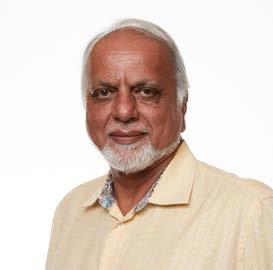
Start Date: 2022
Brief Overview and Progress to Date
Experimental electrophysiological data collected on cancerinduced pain and neuropathic pain will be used to define neuronal patterns. Unique patterns will identify specific neurons implicated in pain generation. Using therapeutics to overcome pain will further confirm the identity of specific neurons. Artificial Intelligence is the new frontier to identify pain patterns.
Related Publication
Zhu YF, Kan P, Singh G. Differences and Similarities in Spontaneous Activity Between Animal Models of Cancer-Induced Pain and Neuropathic Pain. J Pain Res. 2022;15:3179-3187
https://doi.org/10.2147/JPR.S383373
“This funding has enabled us to explore the next frontier in pain research.”
- Dr. Gurmit Singh
An Investigation into the Effectiveness of a New Transitional Pain Service (TPS) on Opioid Cessation After Broad Range of Surgeries Done at Hamilton Health Sciences (HHS) and its Affiliated Hospitals
Primary Investigator:
Start Date: 2019
James Paul, MD, MSc, FRCPC
Brief Overview and Progress to Date
At hospitals affiliated with Hamilton Health Sciences (HHS), we have since adopted the Transitional Pain Service model. The proposed retrospective chart review will collect data from the APS, TPS and chronic pain clinic; elucidate risk factors associated with the development of CPSP and longterm opioid use; and evaluate the efficacy of our Transitional Pain Service in reducing the opioid burden in the HamiltonNiagara Region.
Although many studies have looked at the incidence of and risk factors for developing CPSP, very few have actually taken a comprehensive large-scale approach in assessing whether a TPS is more effective at getting patients off opioid analgesia, in comparison to patients in a control group with usual pain care. This study will provide additional evidence for a Transitional Pain Service as a standard of care for managing CPSP, decreasing opioid burden in the Hamilton-Niagara Region, and give insight into a pain clinician’s increasing role in Ontario’s opioid crisis.
This project is currently on hold because of logistic problems related to Epic, the new hospital information system at HHS. This new system, along with COVID, has made it difficult to implement a transitional pain tracking system in the pain clinic. A plan is being worked on to sort things out. Dr. Madi Ali has been working with the transitional pain service for the past five years and is agreeable to work on this project, helping to track these patients and collect the necessary study outcomes on them.
“IPRC funding has allowed my research team to develop infrastructure to collect important outcomes on our Transitional Pain Service patients. This population of patients has more severe pain and more complex analgesia requirements than the average surgical patient and it’s important that we track their progress to ensure we are providing safe and effective pain control that minimizes the risk on chronic opioid use.”
- Dr. James Paul
Primary Investigator: Harsha Shanthanna, MD, PhD, FRCPC
Start Date: 2019
Brief Overview and Progress to Date
The primary objective of this pilot trial is to assess the feasibility of a definitive trial to determine the effect of topical cannabidiol (CBD) and/or topical diclofenac versus placebo on postoperative pain and opioid use in patients after primary total knee arthroplasty. This will be a 2x2 factorial trial assessing the following treatments: Topical diclofenac, Topical CBD, Topical diclofenac and topical CBD.
It is relevant to note that this study is part of a broader program of cannabis studies, including an oral cannabis trial, on patients having knee arthroplasty and being coordinated from the Arthroplasty Research group at St. Joseph’s Hospital in Hamilton. The regulatory hurdles associated with acquiring approval from Health Canada to launch clinical trials of medical cannabis have proven extremely difficult to meet. The summary of requirements to begin a cannabis trial include: trial registration; local ethics approval; agreement with a licensed producer to provide good manufacturing practice (GMP) certified product; Health Canada approval; and a cannabis research license. The trial has not yet been started.
Primary Investigator: Harsha Shanthanna, MD, PhD, FRCPC
Start Date: 2022
Brief Overview and Progress to Date
The main objective of this pilot trial is to assess the feasibility of a multicomponent pathway on patients having elective total knee arthroplasty, while the clinical objectives are to determine the effects of the pathway on opioid-free pain control, persisting pain and opioid use, functional knee outcomes, quality of life and return to function. Patients in the intervention group will undergo a multicomponent intervention pathway that will be facilitated by an intervention coordinator, linking each patient and their surgical/ perioperative team. So far, we have recruited 30 patients at St. Joseph’s Hospital, and we will be looking to start at Juravinski Hospital in the next four weeks.
A Pilot Study of Association of BIOmarkers and Neuropathic Pain with Intercostobrachial Nerves
Sparing in breast surgery to improve Persistent postsurgical pain-an International RandomizEd controlled trial (BIO-INSPIRE)
Primary Investigator: Harsha

Start Date: 2021
Shanthanna, MD, PhD, FRCPCBrief Overview and Progress to Date
BIO-INSPIRE is a feasibility study that aims to evaluate cytokine levels of IL-1β, IL-6, and TNFα and neuropathic pain in patients participating in the INSPIRE study (a multicentre pilot study of 50 patients to establish the effect of intercostobrachial nerve preservation on persistent postsurgical pain following breast cancer surgery) and underwent axillary lymph node dissection during breast cancer surgery.
The INSPIRE study recruited participants from two hospitals in Canada and two hospitals in India, and 46 of the 50 patients were included in the BIOINSPIRE study. Study samples of BIOINSPIRE are presently being analyzed separately in Hamilton (Canada) and Bangalore (India). We plan to publish the study results in the next few months.
“The BIOINSPIRE study could not have been done without the support of IPRC. The funding was the main source of support for study centres for sample collection, storage and analysis.”
- Dr. Harsha Shanthanna
Primary Investigator: Aimee Nelson, PhD

Start Date: 2022
Brief Overview and Progress to Date
This project investigates the use of a novel biological signal as measured by the coherence between the cortex and the muscles of the neck. The research involves training individuals with chronic neck pain to increase their coherence measure through repeated practice. Practice requires individuals to make head turning movements rightward, leftward, upward and downward and maintain their fixation on the target for a period of time. Two groups of patients are planned. One group will receive coherence measures as feedback; and the other does not receive this feedback. Practice will occur three to five days per week, for four weeks. The hypothesis is that the coherence group will demonstrate increased coherence over repeated practice. The second hypothesis is that increased coherence will be associated with pain relief as measured by pain questionnaires.
“The finances provided by IRPC have allowed the hiring of a Engineering coop student to facilitate the software and coding for the practice training. The IPRC has also covered the majority of the stipend required for a PhD student within the School of Biomedical Engineering.”
- Dr. Aimee Nelson
Persistent Post-Surgical Pain, Postoperative Cognitive Dysfunction, and Resilience in Older People
Undergoing Elective Knee Surgery: A Mixed Method Project to Explore Associations and Underlying Mechanisms
Primary Investigator: Maura Marcucci, MD, MSc
Start Date: 2021
Brief Overview and Progress to Date
ArthroCaP is a proof-of-concept study to explore the interplay between chronic postoperative pain, self-reported recovery (i.e. satisfaction), coping abilities/expectations about surgery, and postoperative cognitive trajectories in >=50 years patients undergoing elective total knee arthroplasty. According to a prospective cohort design, the study includes a longitudinal assessment of pain, pain therapies, a more comprehensive measure of satisfaction after surgery and cognitive performance. It also includes the evaluation of possible biomarkers of pain-related cognitive dysfunction.
“IPRC funding has allowed the design and launch of the project, supporting the costs so far associated with research personnel and biomarkers measurement. Becoming part of the IPRC community has also offered opportunities of dissemination, like presenting at the IPRC Symposium and submission of the study rationale and protocol to the Canadian Journal of Pain.”
- Dr. Maura Marcucci

A Feasibility Study to Assess the Added Value of Integrated Musculoskeletal BiofFeedback Device (IMBED) Combined with Neuromuscular Exercise and Education (GLA-Dtm) to Decrease Chronic Pain in Older Adults with Osteoarthritis
Primary Investigator: Pasqualina Santaguida, PhD, PT, Stuart Phillips, PhD, MSc, BSc and Qiyin Fang, BSc, MSc, PhD, LEL Start Year: 2020
Brief Overview and Progress to Date
The project is partitioned into two phases. The first phase focuses on developing a technology to measure attributes of movement (position, acceleration, EMG activation) and a pain mapping app to be synchronized with the other data collection. We are on our second prototype in which we attached EMG sensors rather than the commercial unit from the first iteration. We have also developed software to display the signal in real-time and save these data files for later review. We are currently working on calibration and accuracy testing. This will be followed by user testing including clinicians and people with osteoarthritis in the Smart home laboratory. We expect this to be completed by November/December.
The second phase is the implementation of the GLAD osteoarthritis exercise program. We will run through the sixweek program at PACE starting in mid-October. We will then start training in two groups (with and without the IMBED device). Additional feedback and user testing follow.
“This funding has allowed us to develop a smart pain mapping app linked with a prototype device to capture motion characteristics for the knee. This will be evaluated for impact on training during the GLAD program in the second phase of the program.”
- Dr. Pasqualina Santaguida
Primary Investigator: Luciana
Co-Investigator:
Start Date: 2019
Macedo, PhD Lisa Carlesso, PhD
The two primary aims of this project were to (1) investigate expectations, satisfaction and lived experiences of surgical patients with lumbar spine (LSS) surgery using a qualitative approach; and (2) Identify modifiable predictors of postsurgical outcomes in patients with LSS.
Data collection has been completed for Aim One of this project. We have conducted 40 interviews (18 pre-op and 22 post op). We have completed coding all interviews and grouped results into themes. Given the richness of data provided to date, we expected a report and at least four manuscripts arising from the interviews (two to be completed by the fall). Concerning Aim Two, we are on the last steps of data analysis. We have completed traditional statistical analysis and are now in the process of preparing for the least square means analysis (as one of our investigators responsible for this was unavailable due to the pandemic). We have published the study protocol and are preparing a manuscript for publication.
“As an early career research this grant was crucial to kick start my research program. As part of this grant, I was able to develop new collaborations within and beyond the university. This includes collaborations with spine surgeons, health care administrators, community organization such as the YMCA, physiotherapists, psychologists and beyond.”
- Dr. Luciana Macedo
“Pain is an inevitable part of life. However, the research supported by the IPRC in partnership with the National Pain Centre, Centre for Medicinal Cannabis Research and the Chronic Pain Centre of Excellence will help reduce the transition to persistent pain and optimize care when pain does become chronic.”
-Dr.
Jason BusseIs there a better way to manage chronic pain patients in a primary setting? That was the question, said Dr. Hillel Finestone from the University of Ottawa, that led to the development of nurse-led programs in a community primary care setting.
Dr. Finestone was just one of the speakers invited to present this past year at the Canadian Pain Care Forum (CPCF). The CPCF met in October 2021, with a virtual session due to COVID-19, and took a look at the role of pain education across multiple disciplines.

In addition to Dr. Finestone, the October meeting saw Dr. Phil Emberley, and members from his team, speak about the Canadian Pharmacists Association’s role in interdisciplinary pain care.
In January 2022, we continued our health professional pain education survey with Dr. Jennifer Nash, an Assistant Professor with McMaster University’s Department of Anesthesia, who presented the pain curriculum in chiropractic training. Dr. Fiona Webster, an Associate Professor at Western University’s Arthur Labatt Family School of Nursing, also discussed the issue of equity of access for pain and addiction care in marginalized populations.
CPCF membership continues to grow. We are now at 129 members, representing 90 organizations, and we are always looking for new members to represent our various stakeholders.
About the Canadian Pain Care Forum
90 participating organizations.
16 advocacy groups or organizations representing people with lived experience.
12 participating hospitals or clinics across the country.
9 participating provincial or national healthcare associations.
“There is sexual dimorphism in pain perception,” said McMaster’s own Dr. Gurmit Singh as he spoke at the seventh Annual Persistent Post-Surgical Pain Symposium. “Our data suggests that pain is differentially regulated in males and females through the immune system. Immune modulation in males is dampened by testosterone and heightened in females due to a more robust immune system and the X chromosome.”
After a two-year hiatus, clinicians, researchers and trainees from around the world gathered at McMaster’s University Club to learn about predictors of chronic pain following surgery. The easing of restrictions meant many participants were able to gather, once more, in person, with the symposium making use of technology to allow those unable to attend to participate remotely.
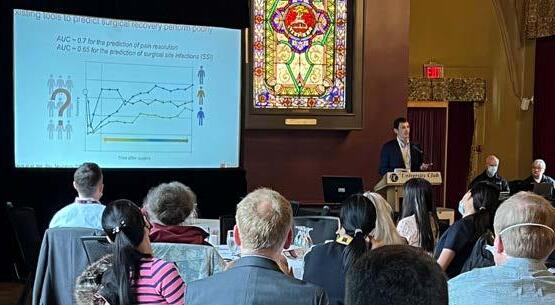
Highlights included talks looking at risk assessment of patients undergoing surgery; reducing hospital stays and complications with enhanced recovery programs; mechanisms of, and interventions for, chronic pain after surgery; and patient-centred pre-surgical rehabilitation for lumbar spinal stenosis. Keynote speaker Brice Gaudillière from Stanford University described his lab’s use of biomarker analysis to predict recovery after surgery including the occurrence of pain.
A poster session was held for those in attendance to peruse and discuss following lunch. More than 50 people took part in the Symposium, and plans for the eighth Annual Persistent Post-Surgical Pain Symposium are already underway.
Top: Dr. Brice Gaudillière, Associate Professor at Stanford University School of Medicine, discusses risk assessment of patients undergoing surgery.
Middle: Drs. Benham Sadeghirad, Li Wang and Jason Busse discuss a research poster.

Bottom: Dr. Henrik Kehlet, Professor at Copenhagen University, presents virtually on enhanced recovery programs to reduce hospital stays.
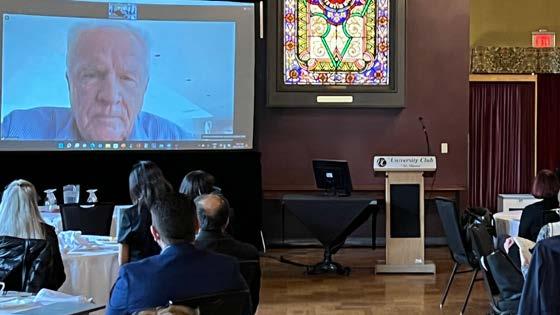
In the five years since its launch, the Michael G. DeGroote Centre for Medicinal Cannabis Research (CMCR) has worked diligently to establish itself as a leader in the field of cannabis research. Most notably, in 2021, the CMCR released a clinical practice guideline for medical cannabis or cannabinoids for chronic pain , published in BMJ.
In collaboration with the Institute for Pain Research & Care, CMCR has provided $1 million in funding to research projects focusing on cannabis in relation to pain. This was all made possible through the philanthropic efforts of the late Michael G. DeGroote. “Michael G. DeGroote’s generous support of the Michael G. DeGroote Centre for Medicinal Cannabis Research has allowed McMaster University to become a world leader in research regarding the therapeutic use of cannabis and the Centre’s innovative trials, influential clinical practice guidelines, and observational studies have been used to establish government policy and promote concordance between evidence and practice,” said
Joint funding from the CMCR and IPRC supported ten projects this past year, including a systematic review examining values and preferences towards medical cannabis among people living with chronic pain, clinical practice guideline and a cross sectional study looking at factors associated with initiating cannabis use after legalization in Canada.
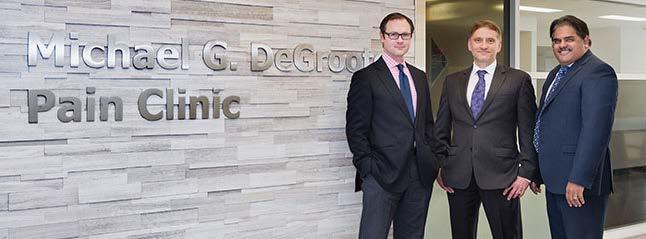
Funded by Veterans Affairs Canada (VAC), the Chronic Pain Centre of Excellence for Canadian Veterans’ (CPCoE) vision is to improve the well-being of military Veterans suffering from chronic pain and their families. The Mission includes fostering a national network of interdisciplinary pain management centers using research and evidence-based strategies to care for military Veterans and their families.

The CPCoE has collaborated directly with Veterans living with chronic pain, and their families, to establish its research priorities, applying the model of Patient Engagement described by the CIHR. Since its launch, the Centre has funded research to improve our understanding of pain in Veterans and improve our ability to treat pain with evidence-based recommendations for clinicians treating Veterans. This past year saw 22 research projects initiated, including five Capacity Building Initiatives.
In addition to hosting four online education sessions, reaching 2,600, this past year saw the CPCoE introduce The Most Painful Podcast, hosted by Tom Hoppe, Chair of the CPCoE’s Advisory
Council for Veterans. The podcast explores various topics relevant to Veterans, their families, caregivers, researchers and clinicians. Episodes call on expert panelists to explore chronic pain and provide insight, education and a better understanding of a variety of pain management therapies, as well as complications and challenges faced by those living with chronic pain.
The Centre’s activities and objectives in the longer-term will be informed by its engagement with Veterans, advisory boards, Board of Directors, ongoing research, and engaging with the clinics delivering care to fine-tune the research learnings that are most applicable in practice. These activities can include initiating clinical trials to further develop new therapies for managing pain, building the network of pain clinics and researchers across Canada, and continuously measuring the metrics associated with timely access to care and quality of life for Veterans and their families.
Creating a national community of care for Veterans & families.
When the Chronic Pain Network (CPN) was awarded funding from the Canadian Institutes of Health Research (CIHR) through the Strategy for Patient Oriented Research (SPOR), it marked an exceptional level of investment in pain research. With its initial funding coming to a close in March 2022, the Network spent much of the last two years focusing on sustainability and seeking out opportunities to grow new partnerships and source of funding.
In August 2021, CIHR announced a new competition for funding, open to the five SPOR Chronic Disease Networks. The call had a specific focus on mobilizing and applying knowledge generated during the initial funding received by networks and would provide up to $3,750,000 of CIHR funding over a four-year period.
The plan submitted by the CPN outlined a cohesive process of engaging people with lived experience, learners, educators, clinicians, administrators and policy makers across Canada to engineer changes that would improve the lives of people living with chronic pain in Canada.
In March, the CPN was informed that it was successful in its application for this additional funding. The beginning of this new iteration of the Network has also seen the formation of a new governance structure, with new committees and memberships. The creation of a more in-depth implementation strategy is underway. The Network has also begun the search to hire knowledge brokers at three sites across the country, as well as a new Managing Director for its Coordinating Centre.
“We will be working closely with other pain organizations across Canada to disseminate key information and findings, utilizing momentum created from the Canadian Pain Task Force to see knowledge generated moved into tangible actions,” said Dr. Norm Buckley, Scientific Director of the CPN.
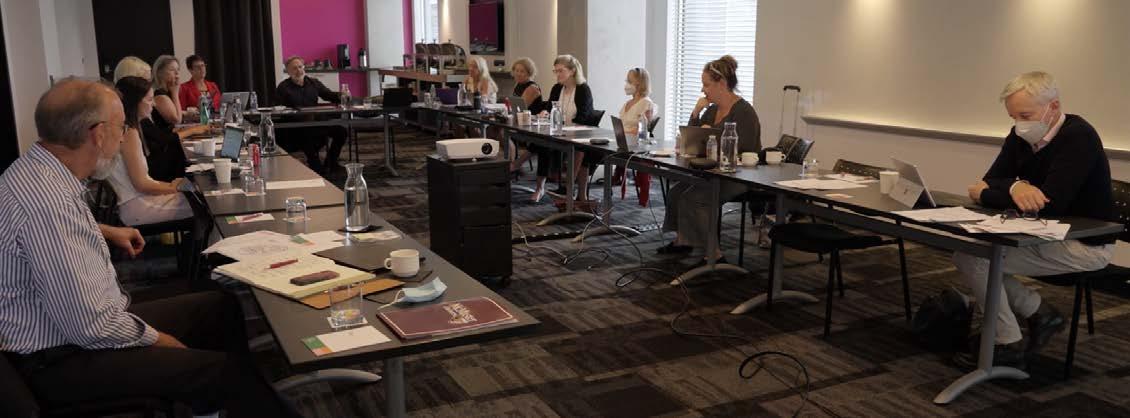
PainHQ is an online resource that was developed in collaboration with McMaster University’s Division of eLearning Innovation (DELi), Launched in September 2015, the site was created as an educational resource for people living with neuropathic pain. The site features videos, articles and blog posts by a multidisciplinary team of experts. Boasting more than 500 users and 1,500 followers on Twitter, the site sees thousands of visitors each year. Analytics indicate that more than 40% of PainHQ users live in the United States and that approximately 56% of users are female. Most users look at two pages when visiting and have an average session duration (total time spent on the site) of two minutes and five seconds.

In the coming year, PainHQ seeks to grow usership by 25% and increase our social media presence to more than 2,500 followers. We also seek to grow our Canadian audience. In order to achieve this, the site will also resume monthly blog posts, as well as work on expanding our resource listing. With the addition of more engaging content and regular updates, we hope to see PainHQ’s average session duration increase to three minutes or more.
PainHQ features a variety of resources, including personal stories, e-learning videos, webinars and expert blogs. Its mission is to educate and inform about neuropathic pain and to help make information about the condition more accessible to the general public.
“ This is one of the most exciting times for pain research and care in the past 30 years. With the Canadian Pain Task Force recommendations, #PainCanada, the Chronic Pain Network’s new focus on Knowledge Mobilization and the Chronic Pain Centre of Excellence for Canadian Veterans, there is investment in, awareness of and focus on pain that we have not seen before. We are proud to be part of this. ”
- Dr. Norm Buckley
Norm Buckley
Scientific Director, Michael G. DeGroote Institute for Pain Research and Care; Professor Emeritus, Department of Anesthesia, McMaster University
Manon Choinière
Professor, Centre de recherche du Centre hospitalier de l’Université de Montréal
Mark Lema
Professor and Chair, Department of Anesthesiology, Jacobs School of Medicine & Biomedical Sciences State University of New York, Buffalo
Jason Busse
Professor, Department of Anesthesia; Director, Michael G. DeGroote National Pain Centre; Joint Member, Department of Health Research Methods, Evidence and Impact (HE&I), McMaster University; Canada Research Chair in Prevention & Management of Chronic Pain
Ian Rodger
Professor Emeritus, Department of Medicine; McMaster University
James Bain
Professor, Department of Surgery; Head, Division of Plastic Surgery, McMaster University
Laura Katz
Assistant Clinical Professor (PT), Department of Psychiatry and Behavioural Neurosciences, McMaster University; Psychologist, Michael G. DeGroote Pain Clinic, McMaster University Medical Centre, Hamilton Health Sciences
Behnam Sadeghirad
Assistant Professor, Department of Anesthesia; Biostatistician, Michael G. DeGroote National Pain Centre, McMaster University
Kimberly Begley
Managing Director, Chronic Pain Network, McMaster University
Ian Gilron
Director of Clinical Pain Research, Professor of Anesthesiology and Biomedical Sciences, Faculty in the Centre for Neuroscience Studies at Queen’s University
Akbar Panju
Medical Director, Michael G. DeGroote Institute for Pain Research and Care; Professor and Vice-Chair (Clinical), Department of Medicine, McMaster University
Joel Katz
Distinguished Research Professor of Psychology Canada Research Chair in Health Psychology York University
Henrik Kehlet Professor of Perioperative Therapy at Rigshospitalet, Copenhagen University
Eleni Hapidou
Associate Clinical Professor (PT), Department of Psychiatry and Behavioural Neurosciences; Psychologist, Michael G. DeGroote Pain Clinic, McMaster University Medical Centre, Hamilton Health Sciences
Gurmit Singh
Professor, Department of Pathology and Molecular Medicine, McMaster University
Mohit Bhandari
Professor and Chair, Department of Surgery; Associate Faculty, Department of Health Research Methods, Evidence and Impact, McMaster University
Joy MacDermid
Professor (PT), School of Rehabilitation Sciences, Institute for Applied Health Sciences, McMaster University; Professor, School of Physical Therapy, Western University
Harsha Shanthanna
Associate Professor, Department of Anesthesia; McMaster University
Michael McGillion
Associate Professor and Assistant Dean Research, School of Nursing, Heart and Stroke Foundation/Michael G. DeGroote Endowed Chair of Cardiovascular Nursing Research, McMaster University
Florentina Miftodi
Manager, Finance and Administration
Michael G. DeGroote Institute for Pain Research and Care; Michael G. DeGroote National Pain Centre, McMaster University
Lisa Carlesso
Assistant Professor, School of Rehabilitation Sciences, McMaster University
Luciana Macedo
Assistant Professor, School of Rehabilitation Sciences, Institute for Applied Health Sciences, McMaster University
Li Wang
Assistant Professor, Department of Anesthesia; Michael G. DeGroote National Pain Centre, McMaster University
James Paul
Professor & Chair of Anesthesia, Research Chair & Director, Acute Pain Services Department of Anesthesia, McMaster University
Philip J. Devereaux
Director, Division of Perioperative Care, Department of Health Research Methods, Evidence and Impact; Professor, Department of Medicine, McMaster University
Randi McCabe
Professor, Department of Psychiatry and Behavioural Sciences, McMaster University
Rachel Couban
Librarian, Michael G. DeGroote National Pain Centre, McMaster University
Megan Groves
Communications Coordinator, Michael G. DeGroote Institute for Pain Research and Care, Chronic Pain Network, McMaster University
Donna Marfisi
Administrative Assistant, Michael G. DeGroote Institute for Pain Research and Care, Chronic Pain Network, McMaster University
The mission of the Michael G. DeGroote Institute for Pain Research and Care is to become a cutting edge institute in the area of chronic pain and a magnet for researchers and trainees in the field.